Want to improve your website’s search engine rankings, but you're not sure where to even begin? One of the best places to start is to learn how to do keyword research for SEO.
Keyword research is a fundamental part of a successful SEO strategy, as it helps you build quality articles around your niche and your audience’s preferences.
In this article, I'll discuss what keyword research is, why it’s important for SEO, how to find keywords and by using which tools, and the SEO strategies you can use.
What is Keyword Research?
Keyword research is the process of identifying the search terms and phrases that people use when looking for products or services in your industry.
It is a critical aspect of any successful SEO content strategy, as it allows you to optimize your website content to rank higher in search engine results pages (SERPs).
By conducting keyword research, you can gain insight into the language and terminology that your potential customers use when searching for solutions to their problems. This information can help you create content that resonates with your target audience, improve your website's relevance and authority in your niche, and drive more traffic to your site.
Why is Keyword Research Important?
According to a study done by Ahrefs, 90.63% of pages on the web get no organic traffic from Google. This is why optimizing your content for the right keywords is so important.
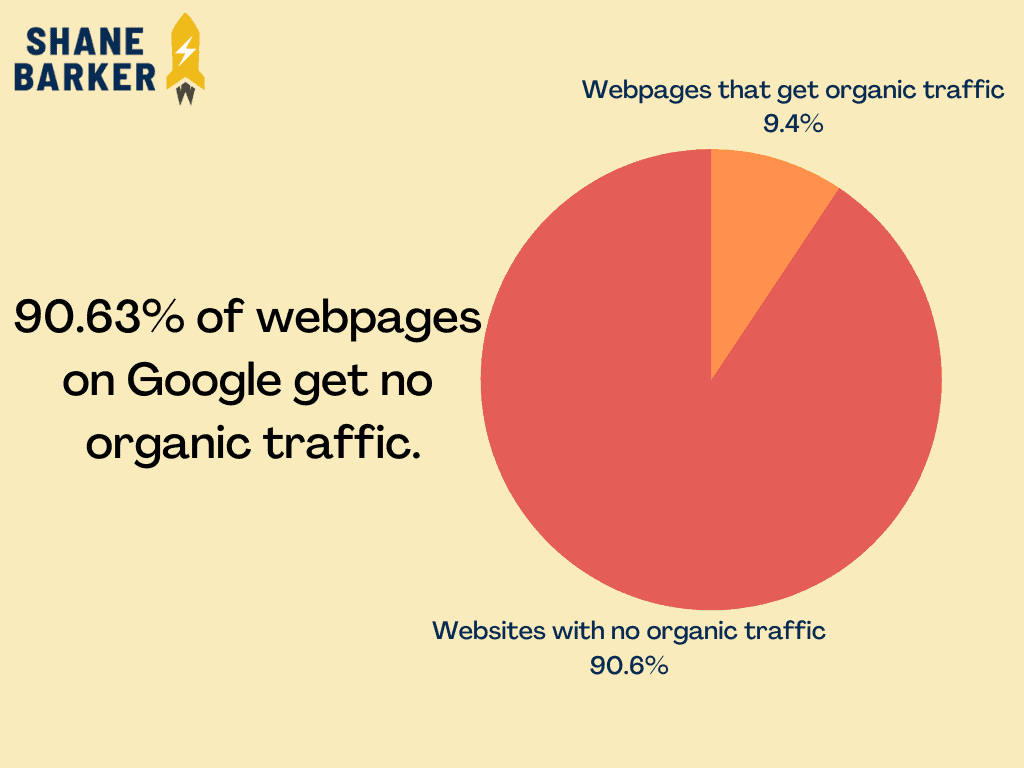
Here are some points on why keyword research is important:
- Improve your search engine rankings (SERPs): 68% of users online begin their experience with a search on a search engine like Google or Bing. It’s important that your website ranks high enough to be visible to these searchers.
- Get competitive insights: Keyword research allows you to analyze your competitors' strategies and identify the keywords they are targeting. This can help you create a more effective SEO and content strategy and gain a competitive edge in your industry.
- Get insights into marketing trends: Keyword research can help you identify emerging trends and popular topics in your industry. By monitoring the search volume and popularity of specific keywords and phrases over time, you can identify new areas of interest and stay ahead of the curve.
- Drives targeted traffic to your website: Keyword research helps you identify the intent behind the search queries used by your potential customers. By creating content that aligns with their search intent, you can increase your targeted traffic to your site and increase your chances of conversion.
- Helps identify cost-effective keywords to improve ad targeting: If you are running PPC campaigns, keyword research can help you identify the most relevant and cost-effective keywords to target in your ads. This can help you increase your click-through rates (CTR) and reduce your cost per click (CPC).
- Identify keywords related to the topics you want to cover: Keyword research can help you identify the most relevant and popular keywords and phrases related to your topics. By incorporating these keywords into your content, you can optimize your content for search engines and attract more organic traffic to your site.

The Key Elements of Keyword Research
There are four primary elements of keyword research that should be considered when creating content: relevance, authority, search volume, and keyword difficulty.
Let’s explore each of these elements in detail:
1. Relevance
Relevance is the most crucial element of keyword research. It refers to the relationship between the keyword and the content on your website.
Keywords that are relevant to your business and the products or services you offer will help you attract the right audience to your site. The more relevant the keywords are, the better chances you have of ranking high in search results.
One way to find relevant keywords is through competitor research. Looking at your competitors’ websites and identifying which keywords they are using will help you create a content strategy with keywords that are relevant to your audience.
There are a few ways to go about this. You can do this using the Keyword Gap tool or by analyzing a competitor’s domain to find their top-ranking keywords.
2. Authority
Authority refers to the credibility and trustworthiness of your website. The higher your website's authority, the more likely it is to rank high in search results.
Most of the popular SEO analysis tools provide authority scores. It’s important to recognize that your authority score should be considered within the niche that your website falls into.

Within the digital marketing niche, Semrush ranks 45 as a high-quality and authoritative website.
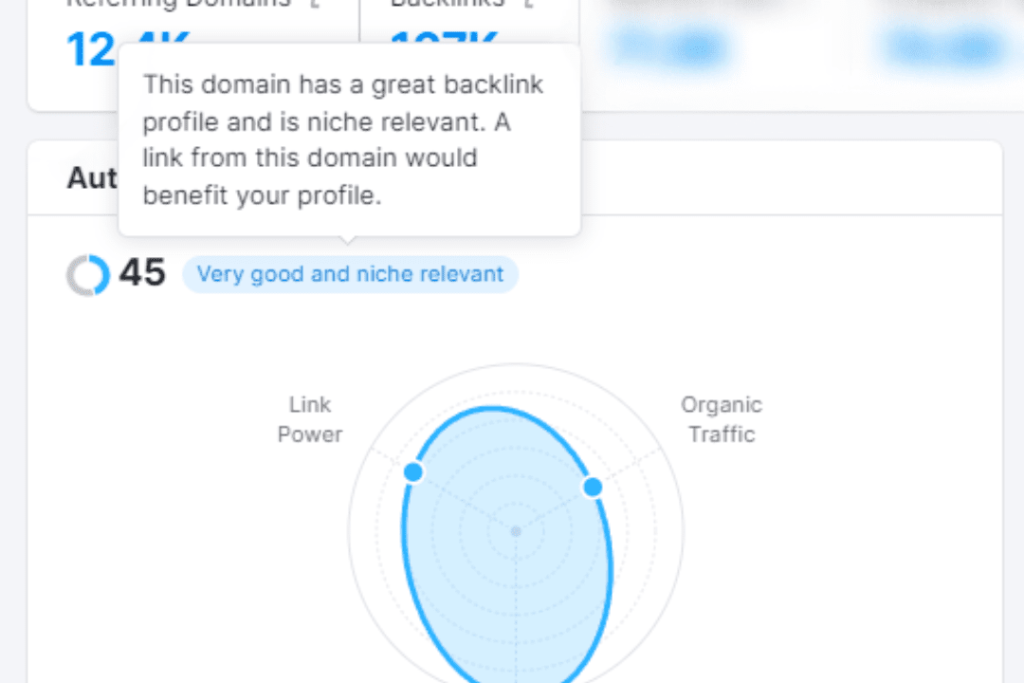
One way to improve your website's authority is by targeting keywords that are related to your niche or industry. By creating valuable and informative content around those keywords, you can establish yourself as an expert in your field.
3. Search Volume
Search volume refers to the number of searches that a particular keyword receives per month.
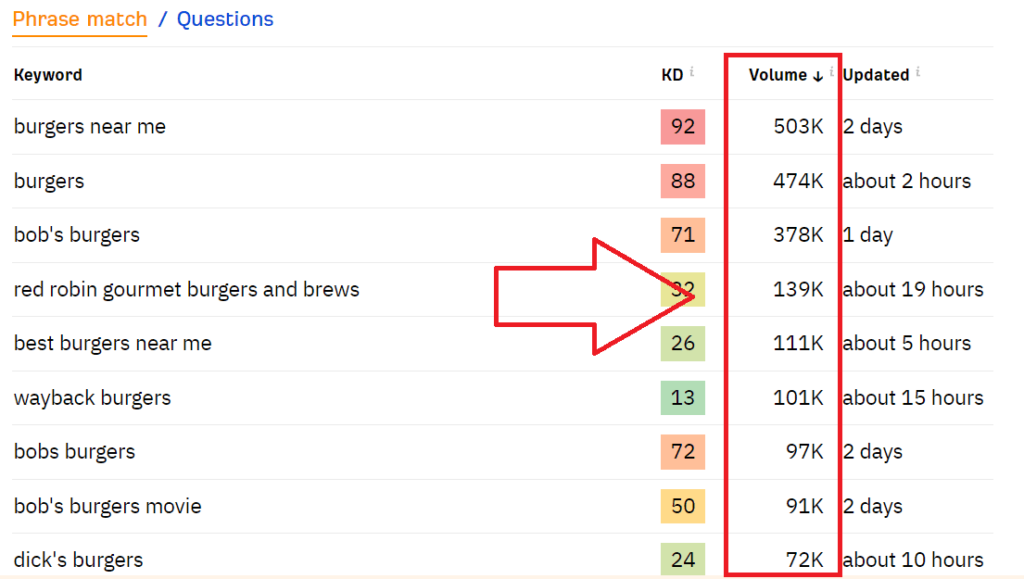
Using Ahrefs free keyword generator, I entered the word, “burgers.” These keyword volumes are the average monthly number of searches for the specific keywords related to “burgers” during the last 12 months.
Targeting high-volume keywords can help you attract more traffic to your site, but it's important to balance search volume with relevance. It's better to target a lower-volume keyword that's highly relevant to your business than a high-volume keyword that's not relevant.
4. Keyword Difficulty
Keyword difficulty refers to how challenging it is to rank for a particular keyword.
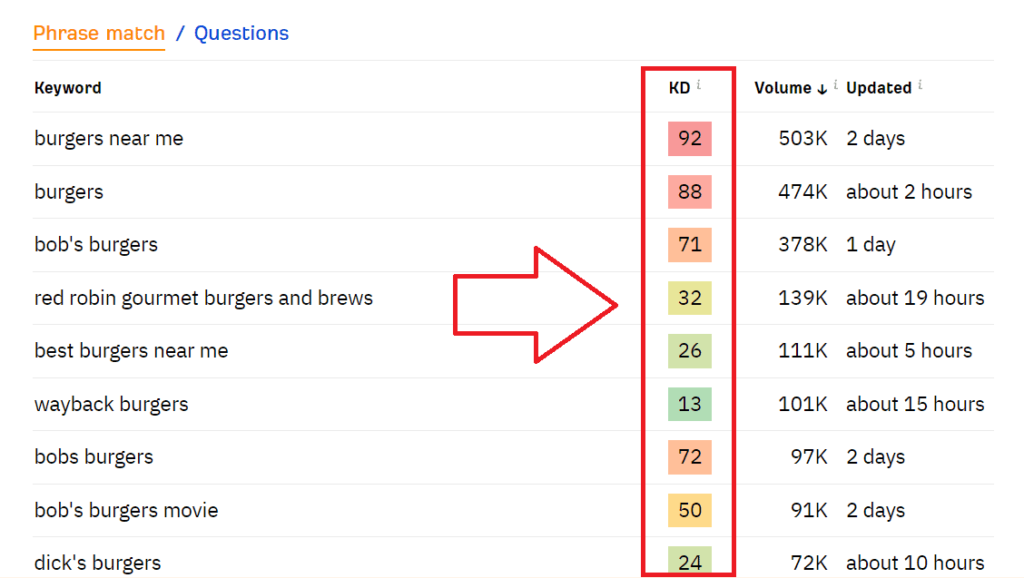
The higher the keyword difficulty, the more competitive the keyword is, and the harder it will be to rank for it. It's essential to balance keyword difficulty with volume and relevance.
Targeting highly-competitive keywords with high difficulty scores may not be the best use of your time and resources.
How to Research Keywords for Your SEO Strategy
Conducting thorough keyword research is crucial to identify the most relevant and profitable keywords for your business.
Here are the five steps to research keywords for your SEO strategy:
Step 1: Make a List of Relevant Topics Based on Your Business Knowledge
Start by brainstorming topics that are relevant to your business and the products or services you offer.
Consider the problems your business solves, the needs of your target audience, and the solutions you provide. This will give you a general idea of the topics to focus on.
You could also consider doing competitive research to help find topics that are doing well for your competitors.
To do this, you could either get a quick domain overview of your competitors using a tool like Similarweb’s free website analyzer tool.

This tool provided me with a quick overview of the top keywords used by a competing website.
For more in-depth analysis, you can use Semrush’s Keyword Gap tool, that directly compares your website with a competitor's website and helps you find keywords they use, that you aren’t using.
You can also identify keywords that they might have lost rankings in, and capitalize on those.
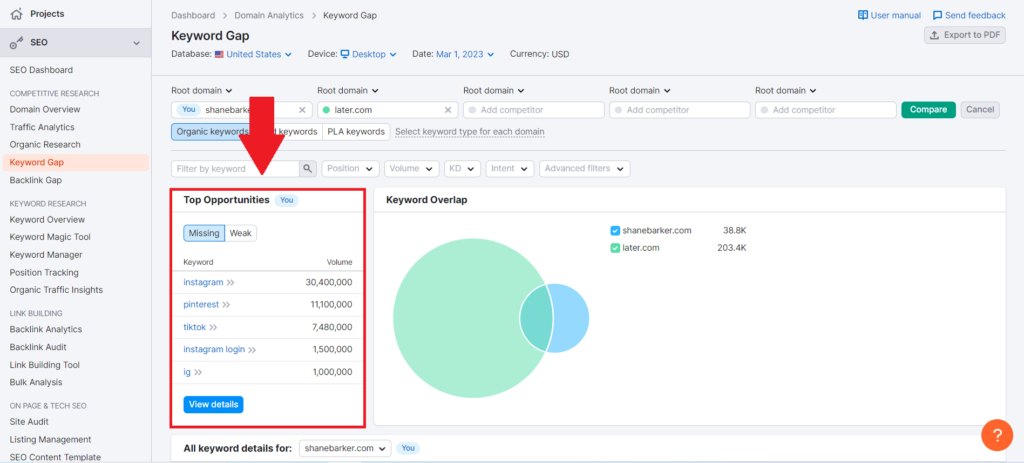
Using both these methods, you should be able to create a list of topics you should focus on.
Step 2: Fill In Those Topic Buckets with Keywords
As discussed earlier, a topic will branch into plenty of other keywords. Once you have a list of topics, start filling them in with related keywords.
Keywords should be specific words and phrases that people use when searching for products or services online. You can use paid tools like Semrush or Ahrefs to find thousands of keywords related to a topic.
If you want to find related keywords you can also use tools like Google Autocomplete or Google Trends to find keywords relevant to your topics.

Using Google Trends, I entered “Nike shoes,” and found related topics and related queries underneath.
AlsoAsked is another excellent tool to find information to fill the topics.

This graph starts with a basic topic such as “burgers,” and then branches out into a whole list of different questions people frequently ask regarding the topic.
Step 3: Understand How Intent Affects Keyword Research and Analyze Accordingly
When conducting keyword research, it's essential to consider the intent behind the search. Are people looking for information, products, or services?
Understanding the intent behind the search will help you choose the right keywords to target.
This includes whether the intent is answering a question, offering valuable insights, reviewing a product, or simply offering alternatives.
Step 4: Research Related Search Terms for Your Keywords
Once you have a list of keywords, it's essential to research related search terms.
This will help you identify long-tail keywords that are less competitive but highly relevant to your business. Use tools like Google Keyword Planner, Ahrefs, or Semrush to find related search terms.
In this case, I used Semrush’s Keyword Magic Tool to find related search terms for the word “shoes”.

Step 5: Use Keyword Research Tools to Your Advantage
Keyword research tools like Google Keyword Planner, Ahrefs, or Semrush can help you identify the most relevant and profitable keywords to target.
Use these tools to analyze search volume, keyword difficulty, and competition. This will help you prioritize your keyword list and focus on the keywords that will have the most significant impact on your SEO strategy.
If you’d like to learn how I ranked over 1800 keywords on Google’s first page, check out my SEO case study.
How to Find and Choose Keywords for Your Website
Finding and choosing the right keywords for your website is an essential aspect of a successful SEO strategy. However, with so many keywords to choose from, it can be challenging to know where to start.
Here are six steps to help you find and choose keywords for your website:
Step 1: Start By Creating a List of Relevant Topics for Your Niche
This is where your keyword journey starts, and it involves narrowing your topic bucket down to 3 -5 topics.
The best way to do this, is to understand what content your audience expects from you. Allow yourself to be in your audience’s shoes for a second and ask a few important questions:
- What does my audience value most?
- What problems are my audience facing?
- What sort of information is my audience seeking?
- How can I help my audience?
- Why am I doing what I am doing?

An excellent tool to find topics relevant to your niche is Semrush’s Topic Research Tool. By simply typing in a niche, such as auto detailing, Semrush offered a large variety of possible topics.
Step 2: Fill in Your Topic Buckets and Prioritize Low-Hanging Fruit
Now that you’ve chosen your topic buckets, you can start filling them out with relevant keywords.
To do this, you can take a topic you’ve chosen, for example, digital marketing, and enter it into Semrush’s Keyword Magic Tool. This tool will provide you with relevant keywords to the topic entered.

If you’re just starting out, and you don’t have much authority or content on your site, it’s a good idea to have a mix of keywords with higher KD, as well as some keywords with lower KD (low-hanging fruit.)
Low-hanging fruit refers to keywords with a low competition level and a fair search volume.
From the picture below you can see the KD, which stands for keyword difficulty. This score represents how difficult it would be to rank well for a certain keyword.
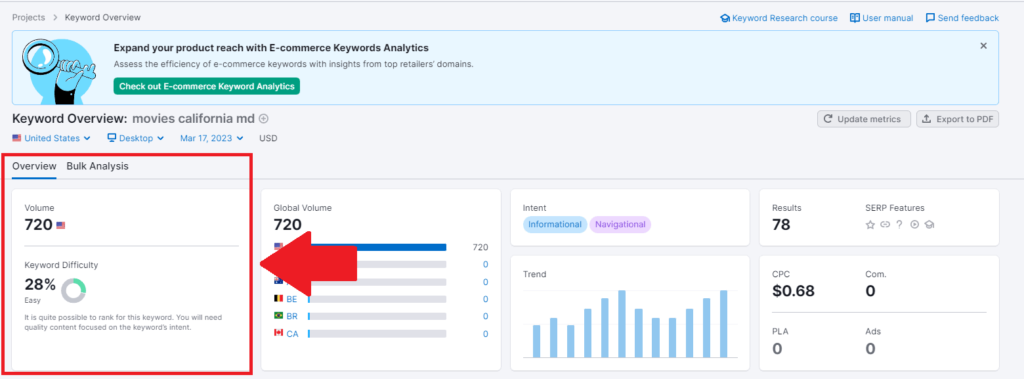
The lower the KD, the easier it will be to possibly rank higher on search engines.
When you’re using the Keyword Magic Tool, you can filter according to the KD. In this case I chose easy.
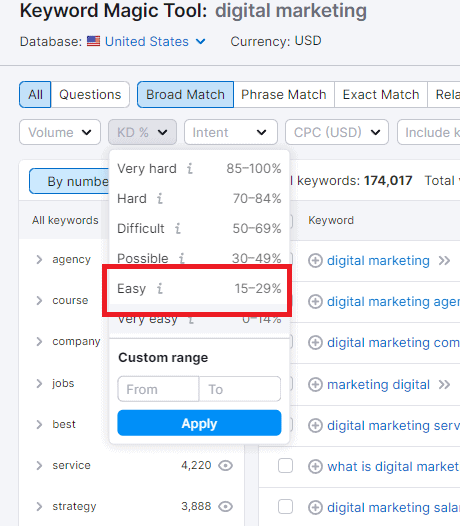
After selecting easy, I was offered keywords that had a lower KD related to the topic “digital marketing”, which I can use to fill in my topic bucket.

It can be tempting to only use keywords with low KD, but it’s important that this is not the only factor to consider when choosing keywords to fill out your topic bucket. It’s a great way to understand how difficult the ranking factor is, but a higher KD shouldn’t scare you away from using a certain keyword, especially if it has a high search volume.
Step 3: Check the Monthly Search Volume (MSV) of Your Chosen Keywords
Monthly search volume (MSV) refers to the number of times a keyword is searched for in a given month. Checking the MSV of your chosen keywords can help you identify which keywords have the maximum potential to drive traffic to your website.
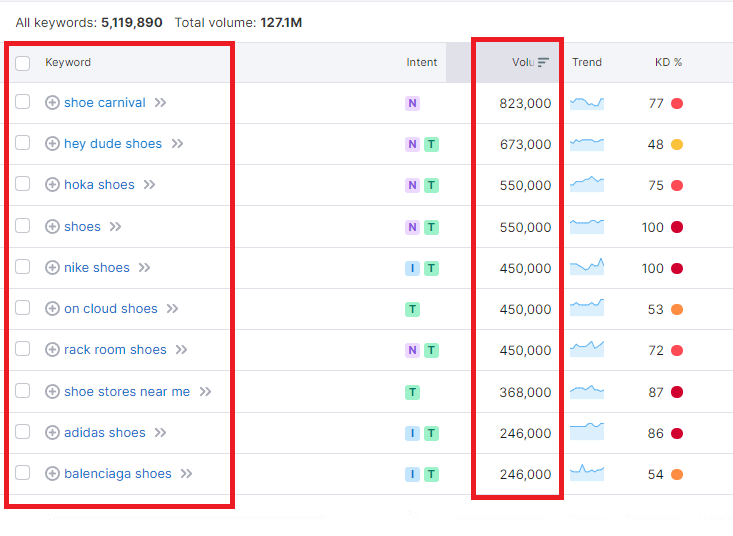
Step 4: Factor in SERP Features As You Choose Keywords
SERP features refer to the different types of results that appear on the search engine results page. These can include image packs, paragraph snippets, list snippets, and video snippets.
If a keyword has a high number of SERP features, it may be more challenging to rank for, and you may want to consider focusing on a different keyword.
When choosing keywords, there’s always a possibility that you could get one of these featured snippets, which is why you need to be on the lookout for opportunities, and maximize your efforts when choosing keywords and creating content.
A really cool feature of Semrush – When tracking your keywords, you can find information about the keywords that rank for different SERP features. You’ll find featured snippets, site links, image packs, etc., and how many of each you’re ranking for.

Here are some examples of each:
1. Image Packs
An image pack is when a site is displayed with a row of images on Google’s search page. When searching for penguins, National Geographic’s site displays an image pack of penguins.

2. Paragraph Snippets
Paragraph snippets provide a short answer to a question (why, how, where), usually between 40 – 60 words long.
Here’s an example of a paragraph snippet:
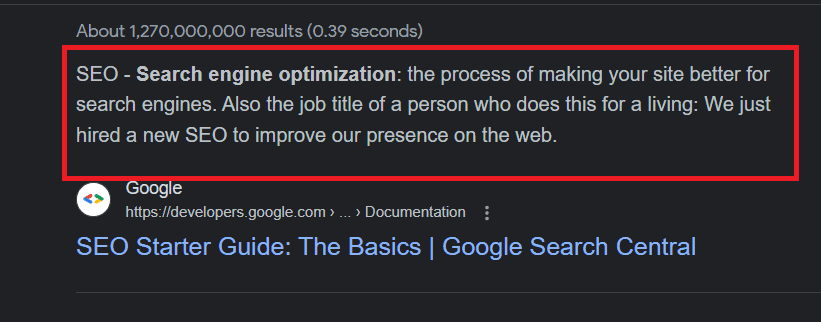
3. List Snippets
List snippets are a list displayed on Google’s search results page related to a specific search query.
In this case, I searched for “top female YouTubers,” and this is the first result, a featured list snippet.

4. Video Snippets
Video snippets are videos that appear on the first results page on Google Search.
Here’s an example of video snippets that came up when I searched for “how to clean a car.”

Step 5: Vary Your Keywords With a Mix of Head Terms and Long-Tail Keywords for Your Topic Buckets
Head terms are short, broad keywords that have a high search volume, while long-tail keywords are more specific and have a lower search volume.
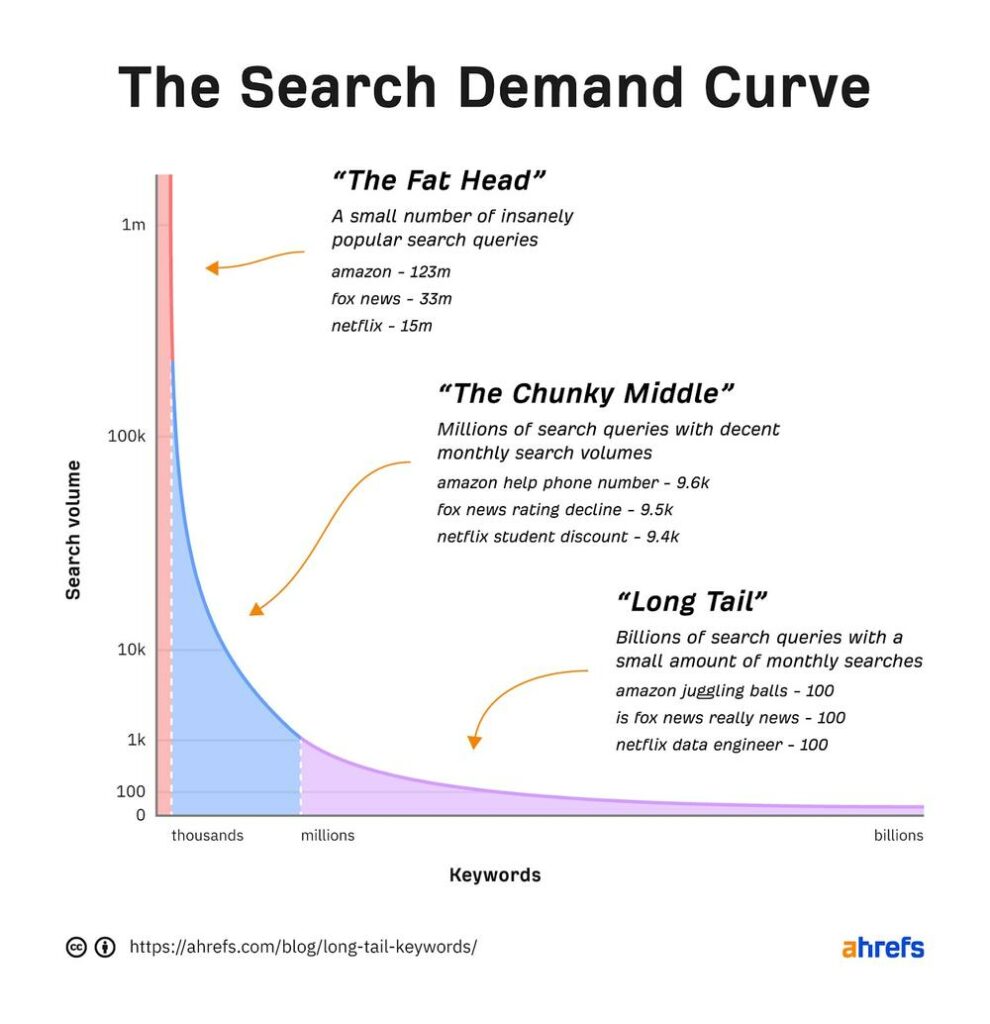
Having a mix of both head terms and long-tail keywords can help you target a broader range of search queries and improve your chances of ranking for a variety of keywords.
A lot of “long tail” keywords can also help you improve your local SEO rankings. Local SEO rankings come from search terms such as “restaurants near me” or “best hairdresser in New York.”
If you optimize your content to include long-tail keywords relevant to such terms, you increase your chances of ranking higher.
Step 6: Find Keywords Your Competitors are Ranking for
Checking how your competitors are ranking for your chosen keywords can help you identify any gaps in your keyword strategy. Use tools like Ahrefs or Semrush to analyze your competitors' websites and identify which keywords they are targeting.
Using Semrush’s Organic Research Tool, I searched my own domain and was offered a list of competitors.

Now that you’ve got a list of your competitors, you can find keywords they’re ranking well for by using Semrush’s Keyword Gap Tool.
This tool will compare keywords that are used by websites. Here you’ll get some more keyword ideas. Also visit your competitors webpages where these keywords are, and look how the content is written and presented.

Here you can also try and target keywords where your competitors have recently lost rankings in.
What Are the Best Tools for Keyword Research?
There are hundreds of tools to help you do keyword research, some free, and others paid or part of a larger platform.
Depending on your budget, and the size of your business, the tool you pick will differ.
Here are my 5 favorite keyword research tools:
1. Semrush – The Best Overall SEO Tool
If you’re looking to up your website’s SEO, including finding the best keywords, then Semrush is by far the best tool out there. I highly recommend the pro version for small businesses that don’t have a huge budget, because it is a jack of all trades.

It offers a full range of SEO tools, including on-page, off-page, and technical SEO tools. It also has a social media toolkit, backlinking tools, and local SEO capabilities.
If you’re curious about why Semrush is my favorite SEO tool, then give their free 14-day pro trial a chance.
ADD CTA HERE (Get your free trial now)
2. Ahrefs – The Best Tool for Competitor Analysis
Ahrefs wasn’t made for SEO at first, but it has been adding plenty of excellent SEO features over the past few years.
What Ahrefs does best though, is competitor analysis. This includes finding keywords and other data of your competitors that you can use to your advantage.

For a detailed comparison of both these tools, check out my review of Semrush vs. Ahrefs.
3. Moz – The Best Free Keyword Tool
Although not as in-depth as Ahrefs or Semrush, the fact that Moz offers a really great free keyword tool makes it hard to ignore. Using the free tool you’ll get insights into the search volume, keyword difficulty, and CTR of keywords used by a domain.
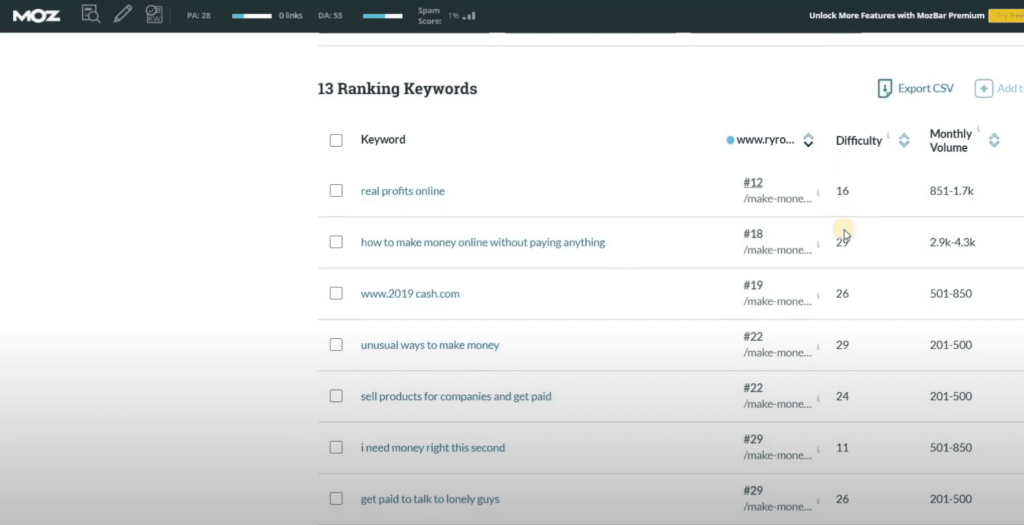
If you’re curious how all three of these tools’ paid versions compare, check out my review of Semrush vs. Moz vs. Ahrefs.
4. WordStream – The Best Free Keyword Tool (No Registration Required)
WordStream is an excellent free keyword research tool, that also allows you to find keywords for your PPC campaigns. It’s completely free, and you don’t need to register with an email ID to use it.
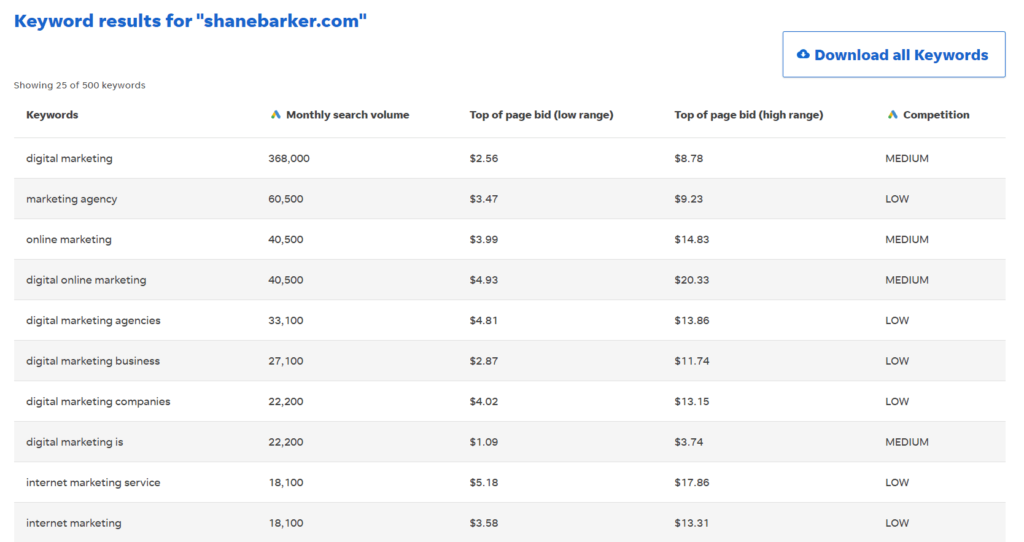
5. Keywordtool.io – Honorable Mention
Keywordtool.io has a free version, although it doesn’t offer much data, it is able to single out keywords for specific algorithms like YouTube, Google, Bing, Amazon, and more.

If you’d like to learn more about the best keyword tools available on the market, then check out my best keyword suggestion tools to increase your search rankings in 2024.
Hone Your Keyword Research Skills Today
Keyword research is an essential part of any successful digital marketing strategy.
Remember to start by brainstorming a list of relevant topics and then use keyword research tools to identify the most promising keywords. Don't forget to analyze your competitors' strategies and keep an eye on search trends to stay ahead of the curve.
It’s also important to note that keyword research is not a one-time activity. You should continually monitor and refine your keyword strategy to ensure that you're targeting the right keywords and staying competitive in your industry.
By following the tips and best practices outlined in this article, you'll be on your way to conducting effective keyword research and driving meaningful results for your business.





![20 best seo chrome extensions that you need to know in [year] 33 best seo chrome extensions that you need to know](https://shanebarker.com/wp-content/uploads/2021/09/seo-chrome-extensions.jpeg)








Thanks for sharing such wonderful information about keyword research for SEO.
Keyword research is so important for every website SEO. Thanks for the informative post.
Hey, this is really useful. Thanks for sharing. This was a great read. Totally enjoyed reading your post 🙂